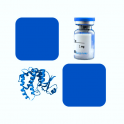
- Remove this product from my favorite's list.
- Add this product to my list of favorites.
Products
Newsletter
 |  |  |  |  |  |

Background
FGF basic is a member of the FGF family of at least 23 related mitogenic proteins which show 35-60% amino acid conservation. FGF acidic and basic, unlike the other members of the family, lack signal peptides and are apparently secreted by mechanisms other than the classical protein secretion pathway. FGF basic has been isolated from a number of sources, including neural tissue, pituitary, adrenal cortex, corpus luteum, and placenta. This factor contains four cysteine residues, but reduced FGF basic retains full biological activity, indicating that disulfide bonds are not required for this activity. bFGF is a critical component of human embryonic stem cell culture medium; the growth factor is necessary for the cells to remain in an undifferentiated state, although the mechanisms by which it does this are poorly defined. It has been demonstrated to induce gremlin expression which in turn is known to inhibit the induction of differentiation by bone morphogenetic proteins. It is necessary in mouse-feeder cell dependent culture systems, as well as in feeder and serum-free culture systems.
Source
Recombinant Human FGF basic, premium grade(BFF-H4117) is expressed from E. coli cells. It contains AA Pro 143 - Ser 288 (Accession # P09038-4).
Predicted N-terminus: Pro 143
It is produced under our rigorous quality control system that incorporates a comprehensive set of tests including sterility and endotoxin tests. Product performance is carefully validated and tested for compatibility for cell culture use or any other applications in the early preclinical stage. When ready to transition into later clinical phases, we also offer a custom GMP protein service that tailors to your needs. We will work with you to customize and develop a GMP-grade product in accordance with your requests that also meets the requirements for raw and ancillary materials use in cell manufacturing of cell-based therapies.
Molecular Characterization
This protein carries no "tag".
The protein has a calculated MW of 16.5 kDa. The protein migrates as 17 kDa±3 kDa when calibrated against Star Ribbon Pre-stained Protein Marker under reducing (R) condition (SDS-PAGE).
Endotoxin
Less than 0.01 EU per μg by the LAL method.
Host Cell Protein
<0.5 ng/μg of protein tested by ELISA.
Host Cell DNA
<0.02 ng/μg of protein tested by qPCR.
Sterility
Negative
Mycoplasma
Negative.
Purity
>95% as determined by SDS-PAGE.
>95% as determined by SEC-HPLC.
Formulation
Lyophilized from 0.22 μm filtered solution in PBS, pH7.4 with trehalose as protectant.
Reconstitution
Please see Certificate of Analysis for specific instructions.
For best performance, we strongly recommend you to follow the reconstitution protocol provided in the CoA.
Storage
For long term storage, the product should be stored at lyophilized state at -20°C or lower.
Please avoid repeated freeze-thaw cycles.
This product is stable after storage at:
-20°C to -70°C for 24 months in lyophilized state;
-70°C for 3 months under sterile conditions after reconstitution.
Bioactivity
Please refer to product data sheet.
(1) "Chitosan/Alginate-Based Hydrogel Loaded With VE-Cadherin/FGF as Scaffolds for Wound Repair in Different Degrees of Skin Burns"
Liu, Wei, Huang et al
J Biomed Mater Res B Appl Biomater (2025) 113 (1), e35533
(2) "A1, an innovative fluorinated CXCR4 inhibitor, redefines the therapeutic landscape in colorectal cancer"
Khorramdelazad, Bagherzadeh, Rahimi et al
Cancer Cell Int (2025) 25 (1), 5
(3) "Understanding Folding of bFGF and Potential Cellular Protective Mechanisms of Neural Cells"
Allsopp, Klauda
Biochemistry (2025)
Showing 1-3 of 3863 papers.
FGF-1, 50 µg - 145,00 €
FGF-2, 50 µg - 145,00 €
Recombinant human FGFR4 /CD334 Protein, His tag, 200µg - 468,00 €
Recombinant Human FGF acidic Protein, Tag Free, 200 µg - 240,50 €
Follow us